Davis Cup reform: Nations vote for 18-team season-ending event
- Published
- comments
Lucas Pouille seals 2017 Davis Cup title for France
Controversial proposals to revamp the Davis Cup and turn it into a season-ending 18-team event have been backed by national tennis federations.
A two-thirds majority among the 140 nations was needed at the International Tennis Federation's (ITF) annual general meeting.
The 25-year £2.15bn plan - funded by an investment group led by footballer Gerard Pique - will start in 2019.
"Sometimes things have to change, or they have the risk to die," said Pique.
The Davis Cup, which was founded in 1900, has been played in the current format since 1981.
"I can understand for a very traditional tournament like the Davis Cup, it's difficult for people and they have doubts," Pique told BBC's World Service.
Pat Cash tells Today the decision was 'rash'
"Everyone agrees that change has to be done, but there are some people who think it needs other changes and that is something I can understand."
ITF chief executive David Haggerty said the decision would elevate the Davis Cup "to new standards".
"This new event will create a true festival of tennis and entertainment which will be more attractive to players, to fans, to sponsors and to broadcasters," he added.
The Lawn Tennis Association, Britain's governing body, opposed the proposals, saying it was concerned about scheduling, financing and the division between member nations.
The ATP intends to stage a revamped World Team Cup in Australia in the first week of January from 2020 - less than two months after the conclusion of the Davis Cup finale in November.
Players were not consulted in the process, but 71% of the voting federations backed the proposals at the AGM in Orlando on Thursday.
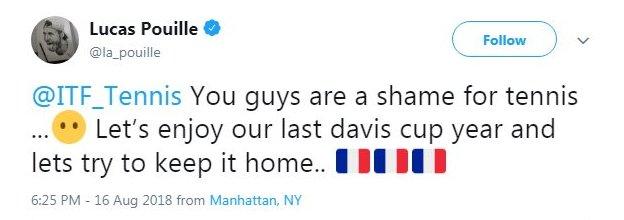
World number 17 Lucas Pouille, who helped France win last year's Davis Cup, criticised the ITF in a tweet
What is the current format and how will it change?
The Davis Cup is one of the world's largest international team competitions with 132 nations taking part in 2018.
Sixteen nations compete in the World Group in a straight knockout, while the remaining countries are divided into three regional zones depending on their location.
It is played in February, April and September and November at home and away venues, with each World Group tie played over three days in a best-of-five tie of five-set matches.
However, an increasing number of top players have skipped matches in recent years to ease their schedule.
The reformed event would see matches played over the best of three sets, culminating in a World Cup-style tournament to determine the world champions.
Twenty-four teams would compete in home and away ties in February, with 12 winning teams advancing to the finals in November.
The four semi-finalists from the previous year's tournament, plus two wildcards, would complete the 18 teams.
The finals - to be staged in Madrid or Lille from 18 to 24 November - would be a round-robin format before a knockout phase, with matches consisting of two singles and one doubles rubber.
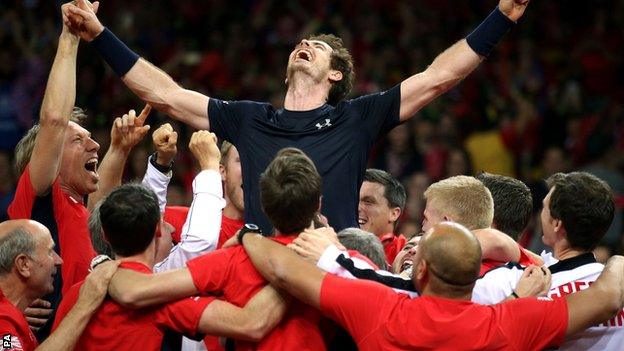
Britain won the Davis Cup in 2015 for the first time since 1936
Who is backing the new event?
Barcelona and former Spain defender Pique founded and leads the investment group Kosmos, which is backed by Japanese billionaire Hiroshi Mikitani.
"This is the beginning of a new stage that guarantees the pre-eminent and legitimate place that the Davis Cup should have as a competition for national teams while adapting to the demands of this professional sport at the highest level," said Pique.
American billionaire Larry Ellison, who runs the Indian Wells tournament, has said he will also invest.
"The new revenues for nations that the event will generate will have a transformative effect on the development of tennis in all nations," added Haggerty.
"Our mission is to ensure that this historic decision will benefit the next generation of players for decades to come."
World number one Rafael Nadal and 13-time Grand Slam champion Novak Djokovic are among the players who have supported Davis Cup reforms.
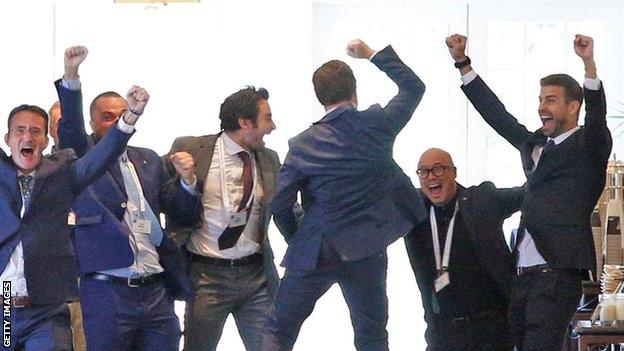
Gerard Pique (right) celebrated the announcement with other members of his Kosmos group
Why did the LTA oppose the plans?
The LTA said it consulted widely before deciding it could not support the proposals "as they stand".
In a statement released on the eve of the vote, it said its concerns were:
"The proposed format and its impact on the tennis calendar, extending the season for players, risks player participation and therefore fan appeal."
"The clarity of how the business case will work in practice, which has led the LTA to conclude that it is too early to seek approval."
"The strength of the ITF in governing and developing tennis across the world will be reinforced by bringing tennis together behind a unified proposal and the LTA feels we have not yet reached that point."
However, the LTA said it recognised "reform of the competition is needed".
"The LTA remains fully supportive of the ITF and its leadership and we will work together on the future of Davis Cup regardless of the outcome of the vote," LTA chief executive Scott Lloyd said.
Who else is against it?
The LTA was one of five federations - along with the United States, Australia, France and Germany - to be given the highest percentage of 12 votes in the electoral voting system.
Tennis Australia, which would host a rival team competition planned by the ATP, and the German Tennis Federation (DTB) also voted against the plans.
"This proposal takes away too much of what makes the Davis Cup special and unique," read a Tennis Australia statement.
DTB president Ulrich Klaus said the decision was a "bitter pill to swallow".
"Sadly, the discussion in the last few days was mainly about money and not about the sport," he added.
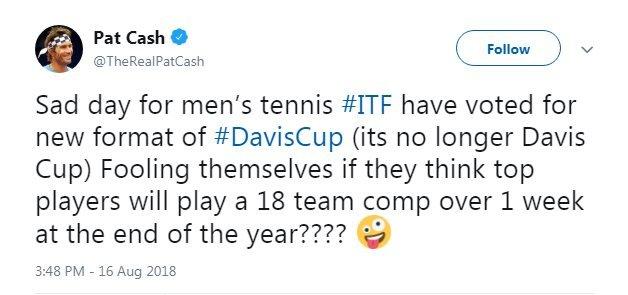
Former Wimbledon champion Pat Cash believes the new format will not attract the world's best players

Australian player John Millman criticised Pique's involvement
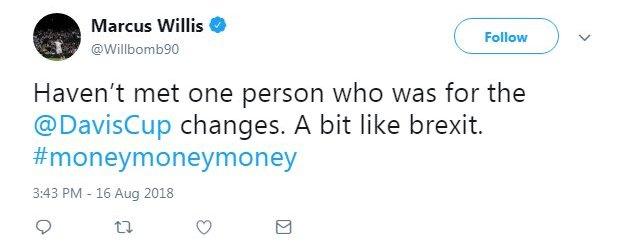
British player Marcus Willis compared the decision to Brexit